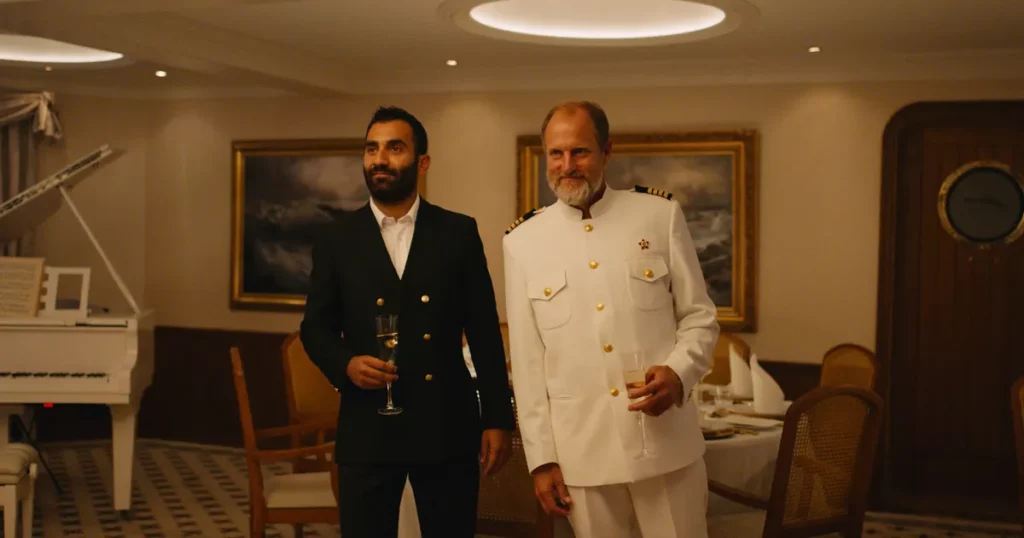Read also:
How to Watch FX Live Without CableHow To Watch AMC Without CableHow to Watch ABC Without CableHow to Watch Paramount Network Without CableRuben Östlund write & directs Triangle of Sadness, a witty, timely satire about what happens when disaster forces the haves & the have-nots together.
As we lurch our way through the sixth or seventh wave of the COVID-19 pandemic, we’ve only just begun to see how much billion dollar companies (and billionaires themselves) profited from the chaos, while smaller businesses and individuals took devastating financial hits. A class war has erupted, if not in real life (yet) then certainly on social media, marked by endless heated debates over privilege, the victims and villains of capitalism, and who the “elite” really are. Ruben Östlund’s Triangle of Sadness satirizes this very unsettling period in time, putting a cheeky spin on class rage, but with an acidic undertaste that lingers long after it’s over.
Triangle of Sadness, named for the area between one’s eyebrows that’s often kept smooth with Botox treatments, opens with a wealthy young couple, Carl (Harris Dickinson) and Yaya (Charlbi Dean, who tragically passed away at age 32 while the film was on the festival circuit), having a tense dinner together. Though their relationship is fraught with jealousy, and Carl’s insecurity over the fact that Yaya makes considerably more money than he does (while also often leaving him to pay for their expensive meals), they’re together mostly because it benefits their social media status. Carl’s a model, and Yaya is an influencer, the kind who takes pictures of herself about to eat a massive forkful of pasta, then pushes it away and claims she’s gluten intolerant. They’re professional attractive people, and it’s nice work, if you can get it.
It even earns them a free trip around the Mediterranean on a luxury yacht, the kind where the staff is not just encouraged, but ordered to never say no to the guests, on the promise that, maybe, they’ll get a good tip at the end of the trip. Though they’re ostensibly on the same side, there’s even a hierarchy among the staff, where the ones who tend directly to the guests’ needs are white Europeans, while the non-whites work below deck, in the kitchen or the engine room. The guests are both obscenely wealthy, and obnoxiously out of touch, treating the staff alternately as servants and entertainment.
All these privileged twits can do is discuss their wealth, and how they amassed it, and no amount of swank accommodations is worth being stuck on a boat in the middle of the ocean with them, even before the food poisoning and seasickness hits. This grotesquely funny sequence is the highlight of the film, shot in a way that you can practically feel the ship lurching back and forth, as it becomes keenly aware that not a single person on board (not on deck, at least) is prepared for the chaos that ensues. The yacht itself doesn’t seem prepared, as too much simultaneous vomiting and diarrhea causes the plumbing to back up, resulting in some of the guests flailing around in their own waste, while the world-weary captain (Woody Harrelson) and a Russian guest (Zlatko Burić) drunkenly discuss Communist theory over an open mic.

After pirates attack and capsize the yacht, a small group of survivors, composed of guests and crewmembers alike, come ashore on what appears to be a deserted island. The hierarchy quickly changes when ship housekeeper Abigail (Dolly de Leon) is the only survivor who can do anything useful in this kind of situation, such as catch fish and start a fire. She’s a brutally efficient leader, punishing disobeyers by withholding food, and making an arrangement with another survivor to exchange sexual favors for special treatment (in this case extra pretzel sticks). Nothing humbles the rich like having to take orders from an undesirable, but the question is, how long is this tenable? And what will happen when they’re eventually rescued?
Triangle of Sadness is Östlund’s first English language feature, and one gets the impression that he intended it to be (or thought it was) more subtle than it actually is. While Harrelson and Burić debating capitalism vs. socialism is very funny, doing it over scenes of fabulously wealthy people literally getting covered in shit is perhaps a bit too much on the nose. Still, in an era where we’ve discovered that there is no bottom to be reached in the continuing suffering of the poor as the rich get richer, perhaps subtlety isn’t necessary. Perhaps it’s a subject that needs to be presented as unsubtly as possible, a sledgehammer between the eyes for anyone who doesn’t yet understand how rigged the system is, and who think that if they were stuck on a deserted island anyone would still care about how much money they have.
Though the third act drags a bit, it compensates with a chillingly ambiguous ending. Östlund also makes the wise decision of not making the yacht guests caricatures. Rather than stock, over the top villains, they just have no sense of the real world, where it’s odd to casually mention that you made your money in arms distribution. On the island, they’re shocked and appalled when Abigail suggests that food should be distributed according to who put the most work into acquiring and preparing it. Those who have long been assured of their position of superiority in the world are now nothing without their wealth and status, and are forced to suck it up and deal with it, like everyone else is supposed to do. It’s a sweet revenge dream for those of us who have to work for a living without a lot to show for it, and Östlund brings it to vivid life with caustic wit.
Triangle of Sadness is now playing in theaters.